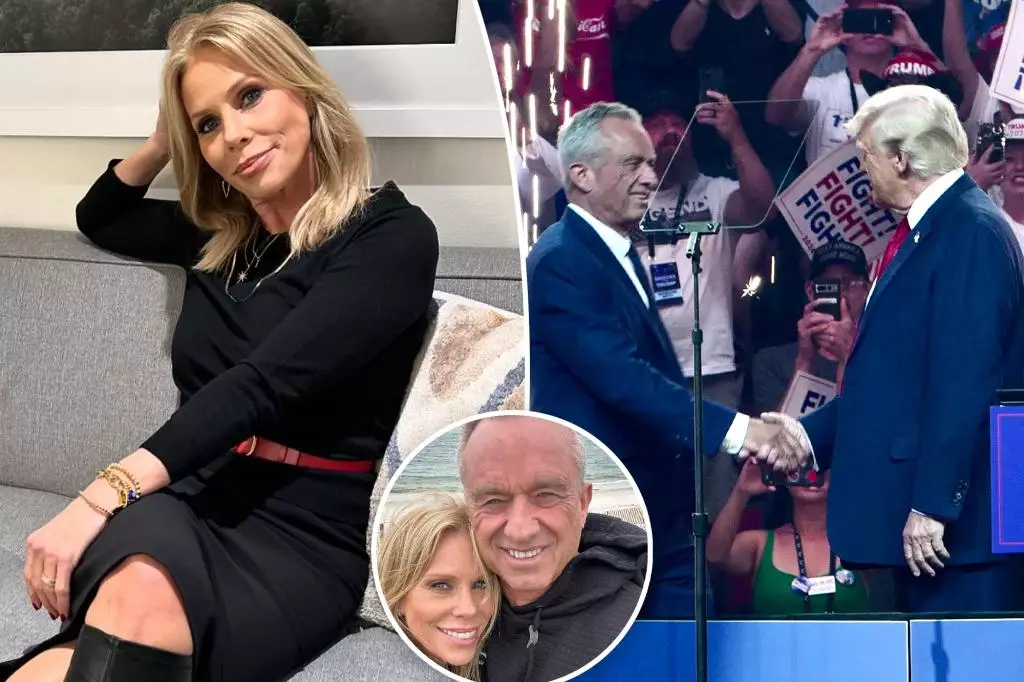The marriage of Cheryl Hines and Robert F. Kennedy Jr. has become a focal point of intrigue and controversy, particularly in light of recent revelations about Kennedy’s alleged romantic entanglement with journalist Olivia Nuzzi. The dynamics of their relationship, set against the backdrop of political affiliations and aspirations, illustrate the complexities that can arise when personal and public life intersect. Sources close to the couple suggest that it is not just infidelity but also Kennedy’s embrace of the MAGA movement that may drive Hines to consider ending their decade-long marriage.
When Hines and Kennedy tied the knot a decade ago, they seemingly embraced the romance of their connection — a member of one of America’s most storied political families paired with a successful actress known for her wit and charm on television. The picturesque setting of their wedding at Kennedy’s family compound in Hyannis Port belied the subsequent turmoil that would envelop their partnership. As is often the case with relationships between public figures, their marriage has thrived under constant scrutiny.
Early on, Hines likely understood the challenges of being married to a Kennedy, especially given the family’s notorious reputation for infidelity. Kennedy’s past relationships hinted at his complicated romantic life, and Hines might have taken it in stride, believing that their love story would diverge from the family’s historical patterns. Yet the real test of this belief has emerged in light of Kennedy’s escalating political ambitions and his unexpected pivot toward Donald Trump.
A significant fracture in their relationship appears to stem from Kennedy’s recent endorsement of Trump and his visible alignment with the Republican party — a stark deviation from Hines’ lifelong Democratic values. Sources indicate that Hines’s disillusionment with Kennedy’s political maneuvers far exceeds any frustration she might feel regarding his alleged infidelity. This situation has placed Hines in a precarious position, as she finds herself supporting a spouse whose actions contradict deeply held personal beliefs.
Kennedy’s admission of Hines’s discomfort with his endorsement further complicates their marital landscape. He acknowledged to the press that while Hines endeavored to support him, it did not align with her values, painting a poignant picture of a woman caught in a duality of love and ideological conflict. This has raised questions about the degree to which their relationship can withstand such an ideological rift.
The Affair: A Matter of Public Record
News of Kennedy’s alleged affair with Nuzzi has overshadowed the couple’s existing troubles, thrusting their private struggles into the limelight. Reports suggest that their connection began professionally when Nuzzi interviewed Kennedy, only to evolve into something far more personal. Accusations of “love bombing” have added another layer to the scandal, portraying Kennedy as a charismatic figure pulling Nuzzi into a whirlwind relationship that she reportedly reciprocated.
Amidst the chaotic media landscape, both Hines and Kennedy seem to navigate a world where personal dignity clashes with relentless public interest. Hines’s decision to appear in public without her wedding ring shortly after the affair was disclosed hints at her emotional state, even as she has been spotted in an apparent show of defiance by wearing her ring later on.
As speculation surrounding the couple’s stability continues to unfold, it is unclear what the future holds for Hines and Kennedy. Sources close to Hines assert that she feels “blindsided” by the affair, and her embarrassment is palpable. This emotional reaction indicates a level of betrayal that transcends the mere act of infidelity — it intertwines with the erosion of shared values and trust.
The potential implications of Kennedy’s political allegiances extend beyond their marriage. If he were to secure a role in Trump’s administration, the ongoing presence of Hines, an outspoken critic of Trump, may complicate matters further. Whether or not Hines chooses to sever ties irrevocably remains an open question, yet the arena in which she finds herself drawn into forces outside her control adds a challenging layer to her existing dilemmas.
The situation between Cheryl Hines and Robert F. Kennedy Jr. captures not only the fragility of personal relationships against an ever-shifting political landscape but also the complexities of love amid contrasting ideologies. As Hines contemplates her next steps, one cannot help but reflect on the myriad factors that shape personal bonds. In a world where loyalty, love, political ambition, and personal values frequently collide, the outcome of this high-profile marriage remains uncertain — emblematic of the broader struggles many face when personal and public worlds collide.

